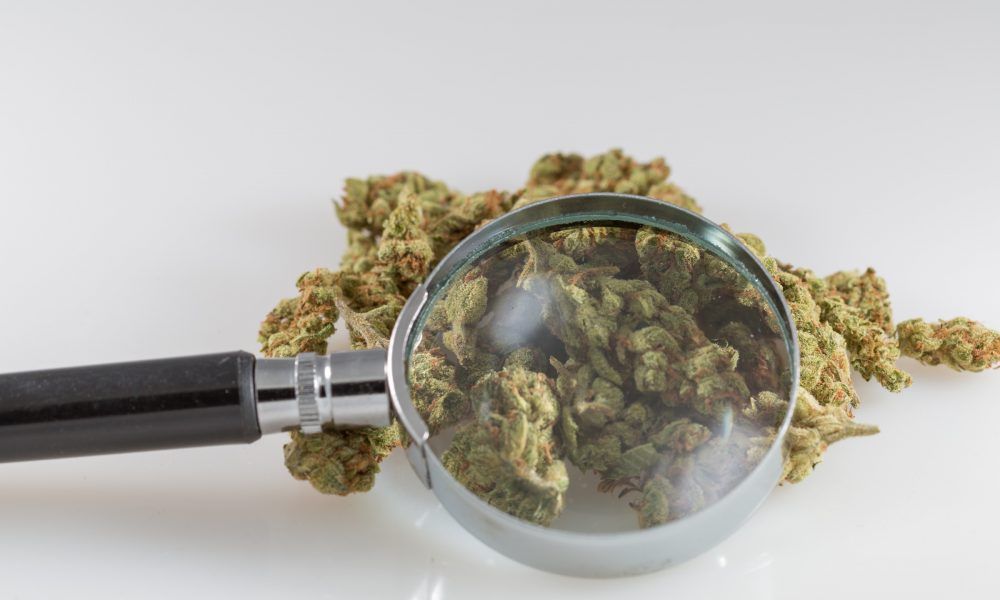I simply cannot comment on the title of this article and stay within Mom's rules.
However, it is a very good article and highlights the cowardliness and nonfeasance of our elected professional politicians and the bureaucracy that they allow to run rampant so as to protect their place at the public trough.
I have yet to hear a coherent defense of why the DEA is allowed to determine rescheduling. Fuck the DEA.
Five states will vote next week on initiatives that would legalize recreational marijuana
By
Lauren Clason and
Sandhya Raman
Posted November 2, 2022 at 9:08am
Corrected 1:37 p.m. | Five states will vote next week on whether to join the 21 states and territories that have legalized recreational marijuana for adults. But the federal government is still stuck on whether to remove the plant from Schedule I of the federal drug code — a category reserved for highly addictive substances with no medical benefit.
The Biden administration’s Oct. 6 announcement that it would revisit that classification comes after previous, yearslong reviews of marijuana’s categorization fell flat, and experts are split on whether things might be different this time.
“If history is to serve as any precedent, I wouldn’t count on this review being wrapped up at a time when there is still a Biden administration,” said Paul Armentano, deputy director of the National Organization for the Reform of Marijuana Laws.
But Rosalie Pacula, a health policy professor at the University of Southern California, believes cannabis will ultimately be rescheduled, pointing to a 2020 change made by the United Nations that loosened control at the international level that the U.S. supported.
“And so I think that reconsideration of our own scheduling here in the U.S. is just a natural extension of how we voted in the world meeting,” she said.
Research needs
The U.S. policy debate is largely centered on the question of whether more research is needed on potential benefits and harms — particularly around potency — since the market is awash in so many different products. The vast majority of states have approved some form of marijuana for medicinal purposes.
“There are so many indications for which the dispensaries are selling marijuana, and yet the evidence for most of them is basically non-existent,” said National Institute on Drug Abuse Director Nora Volkow, citing cancer, post-traumatic stress disorder and attention deficit disorder.
There is some evidence marijuana can help with problems like chronic pain, loss of appetite and symptoms of dementia, she added. There are now also Food and Drug Administration-approved drugs using cannabis compounds.
But the way people consume the plant, such as smoking, can have negative effects too. Volkow also cited concerns around psychosis and impacts on brain development.
NIDA has been following nearly 12,000 children in an ongoing study since 2015, when the children were 9 or 10. Those kids are now 15, around the age when many marijuana users first start. The agency is also launching a medical marijuana registry to track how patients use the drug.
But Armentano dismissed the argument for more research before legalization as a “load of crap,” pointing to the large body of global evidence easily available through sites like PubMed. He said the lengthy administrative process is why Congress should step in instead.
“Congress enacted a bad law,” he said of the 1970 Controlled Substances Act. “It's their responsibility to go and either amend or repeal that law, not to rely on some bureaucratic agencies to do so.”
A House-passed research bill that would speed decisions on marijuana research applications from scientists and cultivators could potentially clear the Senate in the lame duck.
But the bill omits a provision from previous legislation that would grant researchers access to cannabis grown to state specifications. Such a provision would dramatically broaden access to manufacturers and a variety of products not available through federally approved growers, Armentano said.
Still, potential harm studies are done through observation studies where people self-identify as marijuana users. Those studies can be done now, he argued, noting that’s how it was discovered that cigarettes increase the risk of cancer.
“Not because we did a study where we gave people tobacco cigarettes and had them smoke in a controlled setting for 20 years,” he said. “And then said, oh my God, we gave you lung cancer.”
White House push
President Joe Biden’s call for a review triggers a joint process between the Department of Health and Human Services and the Drug Enforcement Administration. The FDA first conducts an eight-factor analysis, which NIDA reviews and decides whether or not to concur. HHS then sends the recommendations to the DEA, which makes the final decision.
HHS and the DEA most recently recommended and ruled against rescheduling in 2016. That review took more than four years.
This time, however, the petition comes from Biden himself. The directive came just a month before a high-stakes midterm election, where the Democrats’ razor-thin majority in Congress is likely to splinter. The move aligns with widespread polling showing that two-thirds of Americans, including at least half of Republicans, support fully legalizing marijuana.
Despite that, a Brookings Institution report found that 81 percent of congressional candidates were silent on the issue.
The legalization movement also lacks support from the medical community, including the American Medical Association and the American Society of Addiction Medicine. Both groups instead support rescheduling cannabis to Schedule II to open it up to more research.
But demoting marijuana to Schedule II would do little to close the gap with states. Any scheduled drug below Schedule I requires FDA oversight, which theoretically means that cannabis products would have to be FDA-approved. Individuals would also need a prescription from a doctor.
In the states
The state landscape is a different story.
Voters in Arkansas, Maryland, Missouri, North Dakota and South Dakota will choose Nov. 8 whether to legalize marijuana for adults 21 and older.
Arkansas’s measure would allow marijuana to be sold commercially through state-licensed retailers. Cannabis sales would include an additional tax with the revenue split among law enforcement, the University of Arkansas for Medical Sciences, drug court programs and the state.
Missouri’s legalization measure also would include a tax. It would additionally allow some individuals charged with marijuana-related offenses to petition for release from incarceration or parole, in keeping with Biden’s related move to pardon federal convictions for marijuana possession.
Maryland’s initiative would direct the state legislature to pass accompanying legislation related to taxation, regulation and distribution.
South Dakota’s measure would allow adults to own and cultivate up to three marijuana plants. It follows the passing of a 2020 state initiative on cannabis that was ultimately struck down by the state Supreme Court.
North Dakota’s initiative is similar to its neighbor’s but would also require the state health department to establish rules regulating marijuana use. A previous state marijuana initiative was rejected in 2018.
In addition, Colorado voters this year will decide whether to decriminalize some psychedelics and implement a “natural medicines” access program to oversee their use.
The state battles are funded on both sides by a constellation of wealthy donors and dark money groups. Pro-marijuana campaigns are massively outspending anti-legalization groups, backed by the likes of hotelier and tobacco heir Nicholas Pritzker, tech guru Sean Parker and financier George Soros.
Anti-legalization groups also claim their own deep-pocketed donors. Safe and Secure Communities’ donors, for example, include chicken magnate Ron Cameron, the owner of Mountaire Farms, and shipping mogul Richard Uihlein, founder of Uline.
Smart Approaches to Marijuana is another group involved in the fight against cannabis and psychedelics in all six states.
Executive Vice President Luke Niforatos said the group is taking a long-term approach to the debate as states increasingly loosen restrictions.
“If they go ahead and make that choice, then what we’re going to do is try to learn everything we can from those state examples, get the pure facts and information out to the public as best as we can,” Niforatos said, citing concerns about addiction and mental illness.
“If that means that down the road this ends up being the final decision across the country, then we’re going to be that accountable voice for the industry,” he added. “But I do think we’ve got a long way to go.”


